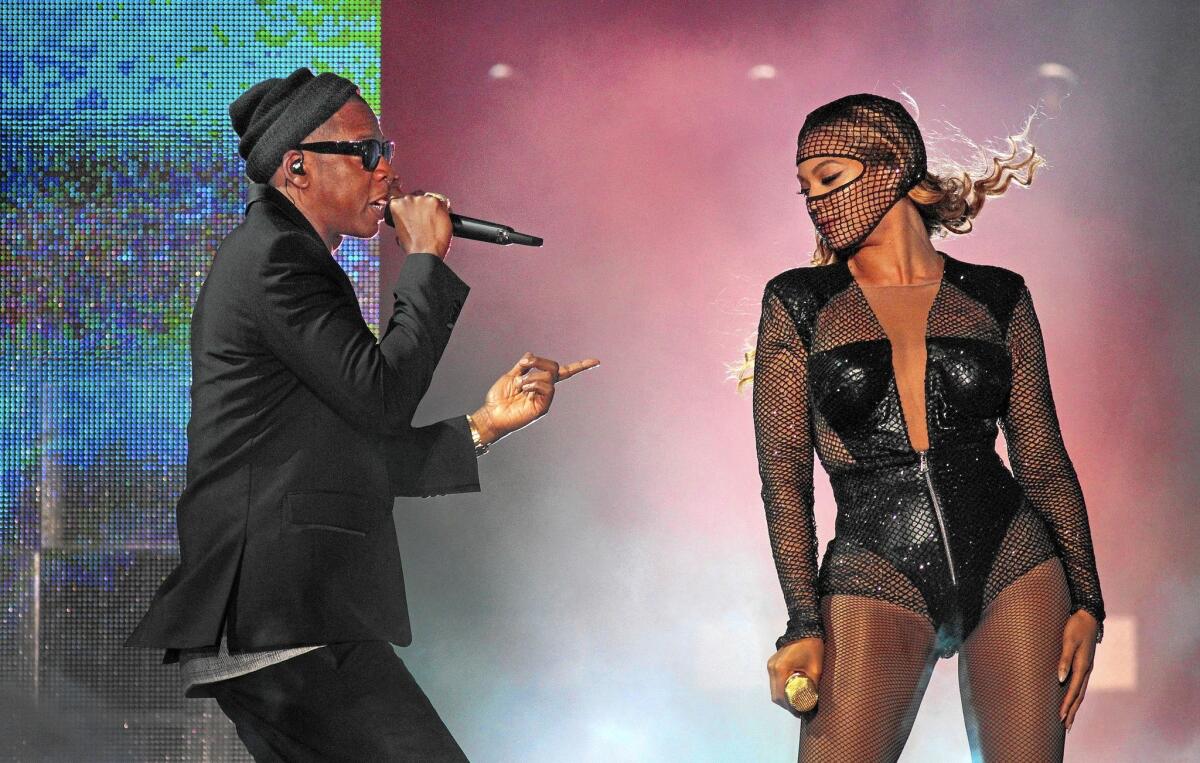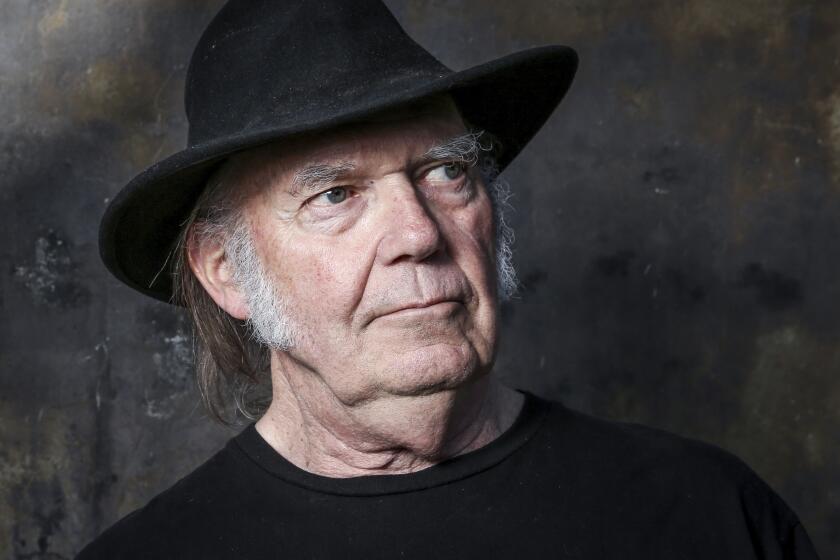Spotify: 99 problems but Jay Z ain’t one

Jay Z is used to success. The rapper has 13 No. 1 albums to his name, built an estimated net worth of $550 million and is married to pop megastar Beyoncé.
His record as a business mogul has also turned out hits. Jay Z ran landmark hip-hop label Def Jam Recordings, owned a stake in the Brooklyn Nets NBA team and launched a formidable entertainment company in Roc Nation.
But now he’s trying to recover from a rare misstep — one that his camp has finally acknowledged as such.
The launch of his newly purchased streaming service Tidal was lauded as a way to shake up the music industry. Instead, it has fallen flat, and rivals such as Stockholm-based Spotify are brushing it off like dirt from their shoulders.
“I’ve got 99 problems,” Spotify Co-founder and Chairman Martin Lorentzon said at a tech industry conference, “and Jay Z is not the one I’m thinking about.”
That dismissive line, paraphrased from Jay Z’s hit “99 Problems,” comes after a tough month for Tidal since launching in late March. He introduced the streaming service at a flashy news conference that boasted the likes of Kanye West, Nicki Minaj and Alicia Keys onstage, all pledging the new venture would be revolutionary.
The Tidal artists onstage with Jay Z, whose real name is Shawn Carter, pledged it would have the best interest of artists at heart, and Keys proclaimed it would “forever change the course of music history.” They said musicians would own and financially benefit from the company — unlike at their Silicon Valley-backed competitors.
They didn’t anticipate the blowback.
Spotify isn’t new to controversy. Here’s a rundown of the music streamer’s history of feuds with artists and songwriters over royalties, privacy and more.
Multiple prominent artists and consumers scolded Tidal’s ostentatious news conference and mocked the idea of music’s 1% complaining about meager royalty payments from streaming platforms. That image provided plenty of fodder for tech bloggers, music critics and fans on social media and in the media.
To make matters worse, Tidal quickly dropped out of the top 700 apps in Apple’s App Store, a plunge that looked to some like a harbinger of the company’s doom. Then co-owner West quietly scrubbed his Twitter feed of any mention of the service. (Though he later restated his support with another tweet: “The love of music is louder than words.”)
“It really hasn’t made the revolutionary impression it promised,” said USC music professor Christopher Sampson. “It’s really fallen off the radar.”
Tidal executives are now scrambling to repair the service’s image as they try to transform Jay Z’s $56-million purchase into a formidable entrant into the streaming music business. They face a tough field of competitors that includes Spotify and Google, and soon will see the arrival of Apple’s new streaming service.
Up for grabs is a fast-growing market where consumers spent nearly $1.6 billion last year to stream music, according to the International Federation of the Phonographic Industry. An estimated 41 million people globally have streaming subscriptions, according to the trade group.
On the business side, Tidal is trying to make deals with wireless carriers, which may bundle Tidal with their mobile packages. Sprint, owned by Japanese tech giant Softbank, said last month that it was in discussions with Tidal for a partnership.
The company, which has yet to turn a profit, is preparing to raise capital to keep growing. Tidal is on the hunt to hire a new chief executive after ousting the previous one several weeks ago, and the company is also trying to ramp up staffing in Los Angeles and New York.
Tidal is also trying to lure in subscribers by beefing up content, an area in which Jay Z can flex the most muscle. The company has been locking down artist exclusives, including new songs and videos from artists such as Beyoncé and Rihanna, as well as quirkier releases like R&B singer-songwriter Erykah Badu’s short western film with a black cast.
Tidal teamed with Prince last weekend for his “Rally 4 Peace” concert in honor of Freddie Gray, who died of spinal injuries suffered while in police custody last month in Baltimore. Audio of the show was streamed free on Tidal, and the company promised to match donations made through its website to Baltimore youth charities.
The streaming service has offered concerts by Jack White (the last stop of his acoustic tour in Fargo, N.D.) and Jay Z, the latter of whom will perform a pair of intimate deep-cuts shows in New York on May 16 and 17.
Tidal hopes such exclusives will persuade consumers to pay the $9.99 a month it costs to access its 25-million track library.
But that hasn’t been enough to assuage critics, especially those in the music industry who have openly lambasted Tidal.
Former Oasis guitarist Noel Gallagher, one of the latest high-profile artists to sound off, recently told Rolling Stone in a profanity-laden interview, “I think ultimately that the spiel they came out with, it was like, ‘Do these people think they’re the … Avengers?’” Other detractors include singer Billy Corgan and the bands Death Cab for Cutie and Mumford and Sons.
Music industry analysts are also not convinced that Tidal’s strategy will be enough, especially for those who are used to getting music for free via YouTube and illegal downloads. Unlike Tidal, many rival streaming services offer free versions supported by commercials alongside paid subscriptions that don’t have ads.
“You’ve still got to overcome consumers’ resistance to paying at all,” said Russ Crupnick, of marketing research and industry analysis firm MusicWatch.
Jay Z, who declined to comment for this article, has publicly defended Tidal. The artist and entrepreneur jumped on Twitter in late April to defend the service and say the company is “doing just fine.”
“The iTunes Store wasn’t built in a day. It took Spotify 9 years to be successful,” he said in a series of tweets. “We are here for the long haul. Please give us a chance to grow & get better.”
While Jay Z has otherwise kept mostly quiet, he has dispatched Tidal executive Vania Schlogel to handle the fallout in the media. Schlogel, who joined Roc Nation as its chief investment officer, aimed to clarify the company’s mission and tackle what she calls “the differential between perception and reality.”
She acknowledged the reception for Tidal’s message was much worse than expected and now wishes they had been more explicit about how it would help regular artists — not just megastars — make a living and win new fans.
“I wish we had told more of what we were going to do at the start, that’s all,” Schlogel said. “Maybe it was naivete, or maybe it was a bit of idealism, but we always felt like our actions would speak louder than words.”
Schlogel also pushed back against the perception that the service is failing.
App downloads, she said, are the wrong metric for judging Tidal’s reception. Instead, the growth of users is the most important stat. Jay Z included in his tweeting spree that the service now has more than 770,000 subscribers. That’s up from the 500,000 Tidal counted at the end of last year, according to a public filing.
By comparison, industry leader Spotify has 15 million paying subscribers. About 45 million people opt for its free, ad-supported version.
Schlogel says its paid-only model will allow the company to pay higher royalty rates than its rivals. Spotify currently hands over 70% of its revenue to rights holders, including record labels and publishers; Tidal says it will pay 75% of revenue.
Analysts said the fumbled launch does not mean Tidal is doomed. They agree with Jay Z that it’s too soon to determine Tidal’s destiny and that the company still has a chance to recover and find a niche of loyal users.
As for Jay Z, Tidal will be but a small blemish on his career even if it fails to deliver on its promise to alter the music business landscape, said music business professor David Rezak, director of Syracuse University’s Bandier Program for Music and the Entertainment Industries.
“If Jay Z falls on his face here, he’s still going to be Jay Z,” he said. “Even if it’s a huge failure, I don’t think it does anything to derail his runaway train of success.”
Times staff writer Devon Maloney contributed to this report.
More to Read
From the Oscars to the Emmys.
Get the Envelope newsletter for exclusive awards season coverage, behind-the-scenes stories from the Envelope podcast and columnist Glenn Whipp’s must-read analysis.
You may occasionally receive promotional content from the Los Angeles Times.








